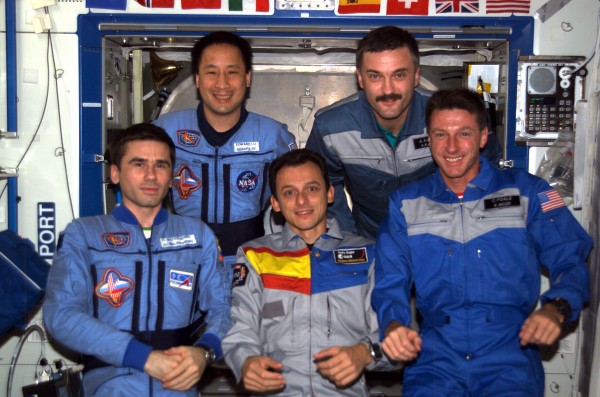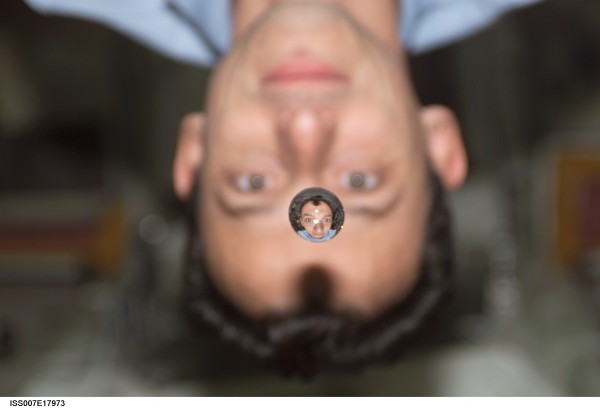"If we die, we want people to accept it. We are in a risky business, and we hope that if anything happens to us it will not delay the program. The conquest of space is worth the risk of life."
-Gus Grissom, who perished in the Apollo 1 fire.
Every once in a while, I try to look past the amazing accomplishments humanity has made in space. And here's a great little piece by Leo Kottke for you to listen to,

This is the crew picture, courtesy of the ESA, from October 2003, of the International Space Station. In the center of the front row is Astronaut Pedro Duque, who kept a diary of his time in space.
Pedro is also the subject of, in my opinion, the most wonderful picture of a human being in space.

Of course, you can click for the ultra-hi-res version of this picture, but can you tell what's going on here? Water drops in space, of course, become perfectly spherical -- a plenisphere, even -- in a completely zero-gravity environment. And perfect spheres have beautiful optical properties. Let's zoom in and take a closer look.

At the distance of the camera, it inverts the image and distorts it ever so slightly, but puts it pretty much in perfect focus. It's a beautiful combination of engineering, optics, and physics all at once, and this image captures it in a beautiful way for me.
Hope your weekend is full of things just as beautiful to you, and I'll see you all next week!

That's a cool trick, using a floating drop of water as a lens. Love to see them do the same trick with a drop of mercury as a perfect mirror.
How times have changed. Challenger, Columbia, TSA.
"Humans in space" is too expensive and dangerous. "Humans in space" is simply playing to popular juvenile sci fi fantasies without producing any SCIENCE.
I think your next post should list all the papers published in peer-reviewed quality scientific journals produced from the ISS and Space Shuttle programs.
And maybe the post after that one should list the papers produced by the unmanned NASA missions.
Go ahead, I dare you!
I've also used that quote by Grissom in a post, and it's worth remembering in each generation. Pioneering will never be risk free, and beauty of the contribution to humanity is absolutely worth every penny.
And Paco... um, fantasies that don't produce science? WOW are you either mis-informed or just plain un-informed! You wouldn't have a PC, a cell phone, satellite TV, weather forecasts, or a thousand other things right now if it wasn't for space agencies attempting to put warm bodies in space for the past 50 years.
Also please see:
http://www.nasa.gov/mission_pages/station/research/experiments/List.html
What a wonderful photo!
Great post!
Just a little nit to pick:the gravity experienced at the ISS is still close to 90% of the gravity experienced at the earth's surface. It's a free-fall but without much air resistance.
@Paco: In many situations humans still beat robots in space. The Hubble telescope could not have been serviced by any reasonable robot. A lot of exploratory work had also been done with the shuttle; it took almost another 20 years before instruments similar to those taken up by the shuttle in the mid-late 1980s were launched as stand-alone missions. Humans do have some use in space. Simply listing publications from manned vs. unmanned missions doesn't prove anything either since each science mission has its own objective and it is available technology and funds which determine whether it's more sensible for a manned or unmanned mission. However, the ISS has been a colossal waste of money.
Leo Kotke: just saw him play last week.
platforumumuz dini sohbet sitelerimizde Seviyeli Sohbet için Google Arama Motorlarında
Lider site olmak ve sohbette bir kıvılcım baslatmak huzur dolu bir sohbetin en iyi mekanı
olmak için çalıÅmalarımızda gayet özen göstermekteyiz
tenk you admin